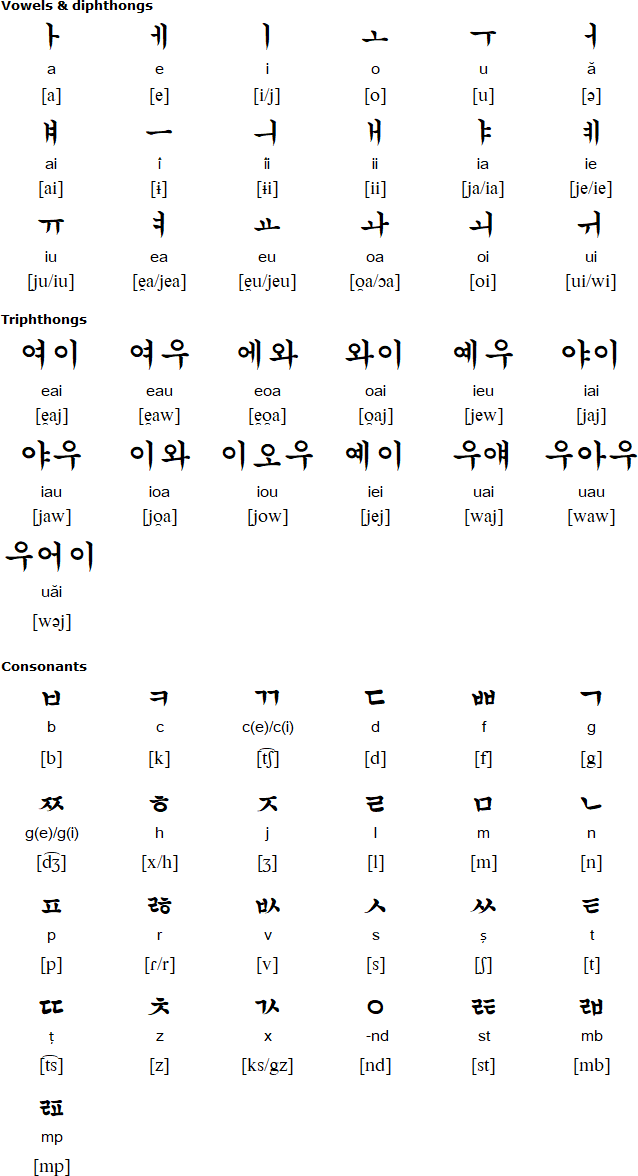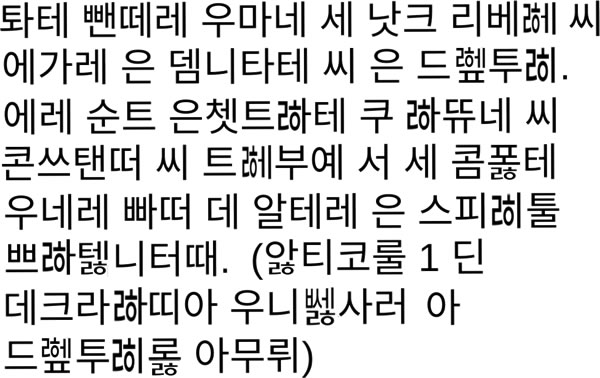
RoHangul
RoHangul is a way to write the Romanian language using the Korean Hangul script. It was created by Laura Brauman, using only characters that are already present in standard Korean.
Notable features
RoHangul script

Download an alphabet chart for RoHangul (Excel)
Notes and guidelines
- The syllables are written in blocks, like standard Korean. The words are separated by spaces.
- The letters composing a word are separated in blocks following the Romanian rules for dividing the word into syllables. E.g.: capotă (ca-po-tă) -> 카포터, not 가퐅어.
- When a vowel doesn’t have a consonant before it, ㅇ serves as a placeholder. E.g.: aer - 아엟.
- Two neighbouring vowels are written as one character only if they are part of a diphthong (they are part of the same syllable). Otherwise, they are separated in a different block. E.g.: iar - 얋, hiat - 히앝; cui - 퀴, cuie - 쿠예.
- The following words are standardised to be written like this: eu - 요; el - 엘; ea - 여 (the personal pronouns I, he and she). The forms of the verb “a fi” (to be) that start with the letter “e” will start with 에.
- The words that end with three of the letter “i” will separate them as 이애. E.g.: copii – 코패 -> copiii – 코피애.
- If a word ends with vowel+consonant, it will be written as is, without adding an 으 after the last consonant (see example from Nº. 2).
- The words that start with two consonants will have 으 after the first one. The words that have three consonants in a row will have 으 after the consonant in the middle. The words that end in two consonants will have 으 after the last consonant. E.g.: spital - 스피탈; abstinent - 압스티넨트; atent - 아텐트.
- Monosyllabic words that have the structure VCV or VVC will have the first vowel alone in the first block. E.g.: azi - 아치, Ion - 이온.
- At the end of a syllable, “ci” [t͡ʃ] and “gi” [d͡ʒ] are written without the following “i”. This happens only if the following two conditions are met: the accent of the word is not on the last syllable; and they have a vowel before them. E.g.: meci - 멖, but: a fugi - 아 뿌찌; dungi - 둔찌.
- Neologisms are written phonetically.
- All the punctuation and orthographic signs are kept and used as they are in Romanian.
Note si recomandari
- Silabele sunt scrise in blocuri, ca in limba coreeana. Se pune spatiu intre cuvinte.
- Blocurile se scriu cat mai aproape de impartirea in silabe din lb. romana. Ex.: capotă - 카포터, nu 가퐅어.
- Cand nu exista o consoana inainte de o vocala, se scrie cu ㅇ. Ex.: aer - 아엟.
- Doua vocale alaturate se scriu cu o singura litera doar daca formeaza un diftong (fac parte din aceeasi silaba) si se scriu separat daca formeaza hiat (silabe diferite). Ex.: iar - 얋, hiat - 히앝; cui - 퀴, cuie - 쿠예.
- "Eu" se scrie 요. El - 엘. Ea - 여. Formele verbului "a fi" care incep cu "e" se scriu tot cu 에.
- Cuvintele cu trei de “i” vor fi scrise cu 이애. Ex.: copii se scrie 코패 si copiii se scrie 코피애.
- Daca un cuvânt se termina cu vocala+consoana, se scriu ca atare in acelasi bloc. Nu se adauga 으 dupa ultima consoana.
- La cuvintele care incep cu doua consoane se adauga "î" dupa prima consoana. La cuvintele cu 3 consoane in mijloc se adauga un î la consoana din mijloc. La cuvintele care se termina in doua consoane se adauga un î dupa ultima consoana. Ex.: spital - 스피탈; abstinent - 압스티넨트; atent - 아텐트.
- Cuvintele cu o singura silaba, cu structura VCV sau VVC, se scriu cu vocala in primul bloc. Ex.: azi - 아치, Ion - 이온.
- La sfarsit de silaba, "ci" si "gi" se scriu ㄲ si ㅉ, fara "i"-ul care le urmeaza in mod normal. Asta se intampla daca: nu se pune accentul pe ultima silaba si au o vocala in fata. Ex.: meci - 멖. DAR: a fugi - 아 뿌찌; dungi - 둔찌.
- Neologismele se scriu fonetic.
- Cratima si alte semne de punctuație se pastreaza si se folosesc la fel.
Sample text in RoHangul

Transliteration
Toate fiinţele umane se nasc libere şi egale în demnitate şi în drepturi. Ele sunt înzestrate cu raţiune şi conştiinţă şi trebuie să se comporte unele faţă de altele în spiritul fraternităţii.
(Articolul 1 din Declarația universală a drepturilor omului)
All human beings are born free and equal in dignity and rights. They are endowed with reason and conscience and should act towards one another in a spirit of brotherhood.
(Article 1 of the Universal Declaration of Human Rights)
Information about Romanian |
Useful phrases |
Silly phrases |
Numbers |
Family words |
Time |
Tower of Babel |
Books about Romanian on: Amazon.com and Amazon.co.uk [affilate links]
Constructed scripts for: Ainu |
Arabic |
Chinese languages |
Dutch |
English |
Hawaiian |
Hungarian |
Japanese |
Korean |
Lingala |
Malay & Indonesian |
Persian |
Tagalog / Filipino |
Russian |
Sanskrit |
Spanish |
Taino |
Turkish |
Vietnamese |
Welsh |
Other natural languages |
Colour-based scripts |
Tactile scripts |
Phonetic/universal scripts |
Constructed scripts for constructed languages |
Adaptations of existing alphabets |
Fictional alphabets |
Magical alphabets |
A-Z index |
How to submit a constructed script
[top]

You can support this site by Buying Me A Coffee, and if you like what you see on this page, you can use the buttons below to share it with people you know.

If you like this site and find it useful, you can support it by making a donation via PayPal or Patreon, or by contributing in other ways. Omniglot is how I make my living.
Note: all links on this site to Amazon.com , Amazon.co.uk
, Amazon.co.uk and Amazon.fr
and Amazon.fr are affiliate links. This means I earn a commission if you click on any of them and buy something. So by clicking on these links you can help to support this site.
are affiliate links. This means I earn a commission if you click on any of them and buy something. So by clicking on these links you can help to support this site.
[top]
![]()



, Amazon.co.uk
and Amazon.fr
are affiliate links. This means I earn a commission if you click on any of them and buy something. So by clicking on these links you can help to support this site.